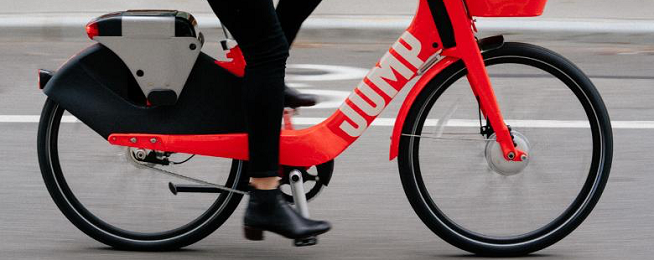Imagine you have the Uber app on your iPhone, you are in a hurry to get from A to B, what do you choose? Car or bike?
Now that the big rideshare firms have added bikeshare to their fleets, the answers are starting to roll in.
If you are commuting to the office and don’t have time to waste, you likely will choose bikeshare.
But if its after hours, and you are catching up with friends over dinner, then you will likely hit the phone button for a car.
The data comes from Uber, that six months ago purchased bikeshare firm Jump, so for the first time it can track customer behaviour in the wild in places where it has both modes available.
What it clearly shows, and this is reinforced by data from Uber’s competitors that also run bikes and cars, is that commuters now know that for most commutes bikes will get them to work faster.
New Jump users were most likely to choose bikes during hours of congestion, and cars during off-peak hours.
"This validated a lot of things we thought would be true and hoped would be true," Jump Bikes CEO Ryan Rzepecki said. “To see an increase in the overall engagement with the Uber platform was positive, and to tangibly see a mode shift happening."
A key factor is that the Jump bikes are electric assist, that may help lure riders that are irregular cyclists.
Uber started with in ebikes in February when it first allowed users to book rides on a Jump bike through its app.
As of July 1, overall trips by new Jump riders on the Uber platform climbed 15%, even as their trips in cars and SUVs declined 10%.
The greatest shift away from cars occurred each weekday between 8 a.m. and 6 p.m., when traffic congestion is at its worst.
"This is having a positive impact on the things cities care about, notably congestion and reducing carbon," said Andrew Salzberg, who leads transportation policy and research at Uber.
Uber isn't alone in feeling that way. Mobility advocates said Uber's findings show people will happily take two wheels instead of four if given the chance -- something the company hopes will lead cities to loosen restrictions on bikeshare fleets.
Many cities strictly limit how many bicycles bikeshare operators can provide. Uber hopes those cities might ease their restrictions once they see how startups such as Jump can ease congestion and reduce pollution.
"People who are serious about moving people more efficiently and fighting congestion should be leaning into the idea of allowing modes like bikes and scooters to be prevalent," Salzberg said.
Transportation experts said Uber's data underscores the potential of electric bicycles to remake cities.


